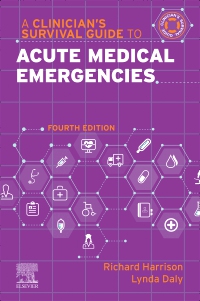
A Clinician’s Survival Guide to Acute Medical Emergencies, 4th Edition
Paperback

The new edition has been updated to cover the management of COVID, the most recent advances in the care of common medical emergencies and the latest iteration of the NEWS Guidance.
With a unique focus on the overlap between medical and nursing management in the Acute Medical Unit, this book is an ideal source for the entire acute medical team.
-
- Clear, simple and accessible advice on caring for patients in the first 24 hours of admission
- Current, evidence-based guidance as a cornerstone to a team-based approach
- Covers all the common emergency conditions and their underlying disease mechanisms
- Explains the rationale of the assessment, observations and management
- Focuses specifically on effective communication with the patients and their relatives
-
- Information on COVID, SARS, Avian influenza and bio-terrorism
- Updated NEWS 2 scoring and appropriate responses
- Revised case histories to reflect current practice
-
Chapter 1 Introduction: Immediate Assessment of the Critically Ill
ABCDE: Immediate Assessment and Intervention
Early Warning: Track and Trigger – NEWS and NEWS
Soft Signs
Additional Monitoring
NEWS: Oxygen Treatment and Target Oxygen Saturation NEWS: ABCDE and ACVPU
Communication: NEWS and SBAR
Conclusion
Further Reading
Chapter 2 Cardiology
Introduction
Common Clinical Problems
Acute Severe Breathlessness
Chest Pain and Atypical Myocardial Infarction Atrial Fibrillation
Immediate Relevance of Heart Disease to Other Acute Medical Conditions
Core Clinical Skills
Anticipating Problems
Cardiac Failure
Primary Problems in the Heart
Heart Muscle Damage
Valvular Disease
Rhythm Disturbance
Secondary Compensatory Mechanisms in Cardiac Failure
Important Biomarkers of Cardiac Failure: B-Natriuretic Peptide and NT-proBNP
The Specialist Heart Failure Team
Types of Heart Failure
Left-Sided Heart Failure
Right-Sided Heart Failure
Congestive Cardiac Failure
Right Heart Failure and Chronic Obstructive Pulmonary Disease
Diastolic Heart Failure
Clinical Features and Management of Cardiac Failure
Characteristics of Patients Admitted Acutely with Cardiac Failure
Principles of Managing Cardiac Failure
Acute Left Ventricular Failure
Acute on Chronic Congestive Cardiac Failure
Important Clinical Tasks in Congestive Cardiac Failure
Specialist Input
Answering Patients’ and Relatives’ Questions in Cardiac
Failure
Ischaemic Heart Disease
Chest Pain
Approach to the Patient Who Has Chest Pain on the Acute Medical Unit
Acute Coronary Syndromes, ST-Elevation Myocardial Infarctions, Non-ST-Elevation Myocardial Infarctions and Unstable Angina
Troponin T and Troponin I in the Assessment of Chest Pain
Risk Stratification in the Management of Chest Pain
Cocaine and the Heart
What are the Other Causes of Acute Chest Pain? When to Try Glyceryl Trinitrate?
What to Say to the Patient?
Critical Clinical Tasks in the Patient With Chest Pain
Sudden Cardiac Death
Atrial Fibrillation and Arterial Emboli
Causes of Atrial Fibrillation
Importance of Atrial Fibrillation
Uncontrolled Atrial Fibrillation
Complications of Atrial Fibrillation
Diagnosis of Atrial Fibrillation
Management of Atrial Fibrillation
Stroke Prevention Versus Bleeding Risk: CHAD DS-VASc and HAS-BLED
Warfarin and New Direct Acting Oral Anticoagulants (DOACS)— Edoxaban, Dabigatran, Apixaban and Rivaroxaban
Critical Clinical Tasks in Atrial Fibrillation
Important Clinical Tasks in Atrial Fibrillation
Answering Relatives’ Questions in Atrial Fibrillation
Infective Endocarditis
How Infective Endocarditis Presents
Pyrexia of Unknown Origin
Catastrophic Valve Failure
Infected Emboli
Role of the Acute Medical Unit in Suspected Endocarditis
Principles of Management in the First 24 H
Drugs in the Management of Acute Heart Disease
Intravenous Furosemide
Antiplatelet Agents
Intravenous Nitrates
Digoxin
Intravenous Diltiazem
Angiotensin-Converting Enzyme Inhibitors Intravenous Amiodarone
Spironolactone and Eplerenone
Further Reading
Chapter 3 Respiratory Medicine
Introduction
The Breathless Patient: The General Approach
Is this Patient’s Breathlessness due to his Heart or Lungs?
What Tests will be Needed to make the Right Diagnosis?
Principles of Emergency Treatment
Respiratory Failure
Type I and Type II Respiratory Failure
Principles of Treatment
Acute Severe Asthma
Mechanisms
Who Gets Acute Severe Asthma and Why? What Goes Wrong During an Attack?
Assessment of Acute Severe Asthma
Caring for the Patient With Acute Severe Asthma
Critical Clinical Tasks During the Acute Attack
Management of Acute Severe Asthma
Initial Emergency Treatment
Subsequent treatment
Assessing Response
Acute Severe Asthma in Pregnancy
Answering Relatives’ Questions in Severe Asthma
Upper Airway Obstruction: Not to Be Confused With Asthma
Chronic Obstructive Pulmonary Disease
Mechanisms
Caring for the Patient With COPD
Critical Caring Tasks During the Acute Attack
Answering Relatives’ Questions in COPD
Respiratory Infections and Pneumonia
Pneumonia
Signs and Symptoms of Pneumonia
Assessment of Pneumonia
The Severity Score in Pneumonia: CURB-65
Finding the Cause of Pneumonia
Assessing the Effect of Pneumonia on the Patient
Management of Pneumonia
Basic Aims of Treatment
Pleural Effusion and Pleural Empyema
Aspiration Pneumonia
Caring for the Patient With Pneumonia
Five Critical Caring Tasks During the Acute Phase
Watch for Complications
Answering Relatives’ Questions in Pneumonia
Spontaneous Pneumothorax
Safety Issues: Pleural Aspiration and Pleural Drainage
Caring for the Patient With a Chest Drain
Important Clinical Observations
COVID- and the Lungs
Further Reading
Chapter 4 Acute Neurological Problems
Introduction
Role of the Acute Medical Unit in Acute Neurological Problems
Ensuring the Safety of the Patient
Prioritising the Initial Management
Glasgow Coma Score (GCS) and ABCDE: Assessing and Keeping the Patient Alive
Critical Clinical Observations
Managing ‘Medical’ and ‘Neurological’ Coma
The Underlying Mechanism in Coma
Practical Management of Coma
Importance of an Eyewitness in Coma
Responding to Neurological Deterioration
How the Clinical State Can Change in the First Hours of Admission
Reaching Appropriate Outcomes
Making the Correct Diagnosis
Urgent Admission to the Acute Stroke Unit in an Optimum Condition
Avoiding a Major Stroke After a Transient Ischaemic Attack
Surviving Intracranial Sepsis
Reaching the Neurosurgeons Alive and on Time
Full Recovery From Self-Harm
Recovery From Reversible Causes of Neurological Emergencies
Stroke and Stroke-Like Emergencies
Causes
Cerebral Infarction (Approximately 80% of All Strokes)
Transient Ischaemic Attacks and Minor Ischaemic Strokes
Intracerebral Haemorrhage (Approximately 10% of All

 as described in our
as described in our 